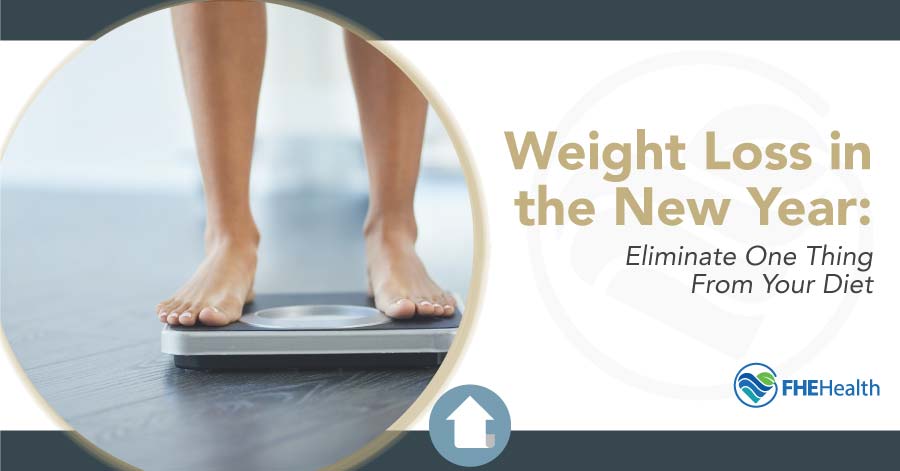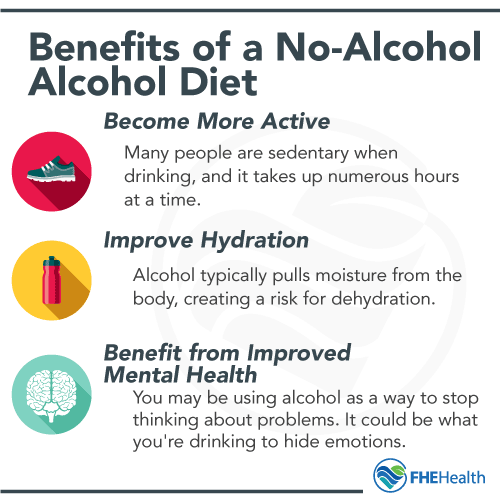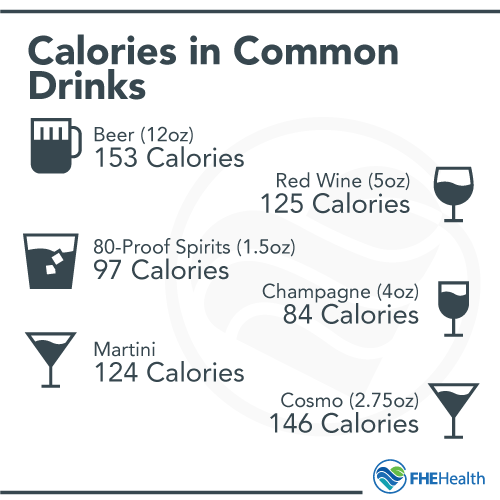
It’s the time of the year again to set New Year’s goals. This year, you may once again try to lose weight. While that may be beneficial, it’s important to think about why you might not have succeeded in the past. For some people, alcohol and weight loss go hand in hand. Read on to learn about the benefits of a no-alcohol diet.
How Many Calories Are You Drinking?
 It’s not uncommon to pick up a drink here and there without considering what’s in it. However, just because it’s liquid doesn’t mean you’re not getting calories. Does alcohol make you gain weight? It can, depending on how much you drink.
It’s not uncommon to pick up a drink here and there without considering what’s in it. However, just because it’s liquid doesn’t mean you’re not getting calories. Does alcohol make you gain weight? It can, depending on how much you drink.
Take into consideration a few examples based on insight from the U.S. National Library of Medicine:
- The average regular beer contains approximately 153 calories in a 12-ounce serving. Even a light beer has 103 calories. Some craft beers have as many as 350 calories.
- A 1.5-ounce drink of rum gives you about 197 calories, while vodka, gin, and whiskey have about 116.
- A mai tai has about 306 calories in 4.9 ounces. A tequila sunrise has about 232. A white Russian offers 568, while a chocolate martini packs 341 calories in 2.5 ounces.
Most people don’t treat the calories they consume in alcoholic drinks as calories they count on a diet. However, these calories can certainly add up, especially if you consume them frequently. Even ardent calorie counters who use apps are prone to forgetting to enter drinks into their programs. Cutting them out of your diet may help you reach your weight loss goals faster.
How Does Alcohol Impact Your Metabolism?
When it comes to whether alcohol makes you gain weight, it’s not just the calories that matter but also alcohol’s impact on your metabolism. Metabolism, a term that refers to the chemical processes your body uses to create energy, regulates how quickly and effectively your body breaks down the calories you consume. Alcohol changes this process in several ways:
- Slows metabolism. After you drink alcohol, your body puts a lot of energy toward breaking it down, prioritizing this over other processes. This can slow down the process of breaking down the fat and carbohydrates you eat, setting off a chain reaction that leads to weight gain.
- Prevents fat loss. Alcohol inhibits fat oxidation, which is the process your body uses to convert fat cells into usable energy. Instead of using that fat, the body stores it, especially around the midsection.
- Prevents nutrient absorption. When you drink alcohol, your body doesn’t absorb important nutrients from your food. While this doesn’t directly lead to weight gain, it can negatively affect your overall health.
- Harms the liver. The liver metabolizes alcohol, but excessive drinking can overwhelm this vital organ, leading to conditions such as fatty liver disease.
If you choose to drink alcohol, it’s important to do so in moderation. If you have concerns about how your alcohol consumption affects your metabolism and the amount of body fat you carry, you should talk to your healthcare provider.
What Could a No-Alcohol Diet Do for You?
How much does alcohol affect weight gain? To consider this, think about what may happen if you decide to ditch alcohol in the new year. If your lifestyle includes a significant amount of drinking, such as more than a few drinks a week, that could be impacting your overall health as well.
Become More Active
When you stop drinking alcohol, you may find yourself more active. Many people are sedentary when drinking, and it takes up numerous hours at a time.
When you get rid of the habit, you open the door for new activities. Try replacing drinking with activities you like so you don’t feel you’re missing out.
Improve Hydration
The health benefits of no alcohol extend to improvements in how your body retains moisture. If you stop drinking alcohol, you’ll be better hydrated. Alcohol typically pulls moisture from the body, creating a risk for dehydration.
Also, when you drink alcohol, you’re missing key opportunities to drink water. Hydration improves your overall health, flushes away toxins in your cells, and can help you lose weight.
Benefit from Improved Mental Health
Improved mental health is another key advantage of getting rid of alcohol. You may be using alcohol to stop thinking about problems. It could be what you’re drinking to hide emotions.
Dealing with those emotions is healthier for you. That alone can give you the motivation and self-esteem you need.
An alcohol-free lifestyle provides you with an advantage in terms of mental health. Most people don’t realize that routine use of alcohol can create dependency.
This type of addiction can also worsen underlying mental health concerns. The result of not drinking is that you’re benefiting in the long term from improved mental health.
Try This Change in the New Year

The health benefits of a no-alcohol diet are numerous. It sounds good and like a sure-fire plan, but how do you make it work? Consider a few tricks to improve the odds of seeing weight loss success.
Make It a Group Effort
Whether you pair up with a friend, loop in your office friends, or work with a spouse, don’t do it alone. Convincing others to stop drinking isn’t always easy, though.
Explain why you want to give it a try. Then, create a goal to reach as a group or individually. Incorporate a prize for the winner of a contest. No matter what you do, by having someone to keep you honest, you’ll be more successful.
Create a Visual Representation
Acknowledge your landmarks throughout this process. Record what you weigh now and what your typical week looks like with alcohol consumption.
Then, focus on tracking your goals. As you see the pounds come off, be sure to appreciate your little victories.
Replace Alcohol with Good Things You Love
The key trick to giving up alcohol is to recognize that, right now, it’s filling a need for you. Replace that with something else that makes you happy or keeps you active. Consider ideas such as:
- Going to the rec center. Swim each day, play a game of pickup basketball, or use the fitness equipment. You’ll appreciate your body more later in the day.
- Taking a walk. Instead of going to the bar after work, head to a park to do some walking.
- Finding a distraction. Start a new hobby that gets you some exercise and draws your attention away from not drinking.
The key is to fill your time so you don’t want to drink and replace drinking with something you know you’ll love even more. Doing this encourages long-term resistance to drinking. When you make this change in the new year, you’ll have a refreshed perspective on your life and your health as a whole.
Are You Having Trouble Cutting Out Alcohol?
 If you find you can’t cut out alcohol or you’re having some side effects from doing so, that may mean you have an alcohol dependency. If that’s the case, it’s more important than ever to seek help for your alcohol use. Here are a few symptoms to consider:
If you find you can’t cut out alcohol or you’re having some side effects from doing so, that may mean you have an alcohol dependency. If that’s the case, it’s more important than ever to seek help for your alcohol use. Here are a few symptoms to consider:
- Do you think about getting a drink every day or so?
- Are you unable to resist having a beer or two a day?
- Do you find yourself irritable and moody without alcohol?
- Are you feeling poorly, perhaps with aches and pains?
- Are you struggling with headaches suddenly?
If this is happening or any other symptoms occur, alcohol addiction is something you should speak to a therapist about soon. While it may seem harmless right now, alcohol impacts more than just your weight.
Having a dependency on alcohol is nothing to be ashamed of or something to hide. It means this is an opportunity for you to seek help with the underlying problem. You can recover from it.
Let FHE Health Help You Recover
If you’re struggling with giving up alcohol, it’s time to seek help. Contact our team at FHE Health to learn more about dependency and whether you could be at risk.






